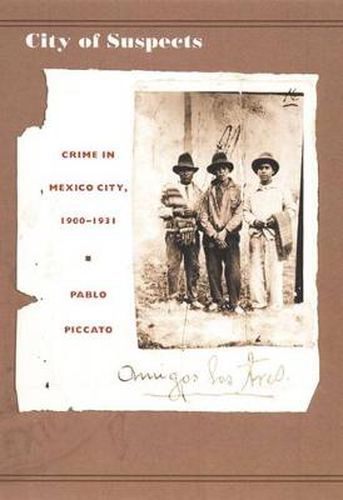Readings Newsletter
Become a Readings Member to make your shopping experience even easier.
Sign in or sign up for free!
You’re not far away from qualifying for FREE standard shipping within Australia
You’ve qualified for FREE standard shipping within Australia
The cart is loading…






In City of Suspects Pablo Piccato explores the multiple dimensions of crime in early-twentieth-century Mexico City. Basing his research on previously untapped judicial sources, prisoners’ letters, criminological studies, quantitative data, newspapers, and political archives, Pablo Piccato examines the paradoxes of repressive policies toward crime, the impact of social rebellion on patterns of common crime, and the role of urban communities in dealing with transgression on the margins of the judicial system. By investigating post-revolutionary examples of corruption and organised crime, Piccato shines light on the historical foundations of a social problem that remains the main concern of Mexico City today. Emphasising the social construction of crime and the way it was interpreted within the moral economy of the urban poor, he describes the capital city during the early twentieth century as a contested territory in which a growing population of urban poor had to negotiate the use of public spaces with more powerful citizens and the police. Probing official discourse on deviance, Piccato reveals how the nineteenth-century rise of positivist criminology-which asserted that criminals could be readily distinguished from the normal population based on psychological and physical traits-was used to lend scientific legitimacy to class stratifications and to criminalise working-class culture. Furthermore, he argues, the authorities’ emphasis on punishment, isolation, and stigmatisation effectively created cadres of professional criminals, reshaping crime into a more dangerous problem for all inhabitants of the capital. This unique investigation into crime in Mexico City will interest Latin Americanists, sociologists, and historians of twentieth-century Mexican history.
$9.00 standard shipping within Australia
FREE standard shipping within Australia for orders over $100.00
Express & International shipping calculated at checkout
In City of Suspects Pablo Piccato explores the multiple dimensions of crime in early-twentieth-century Mexico City. Basing his research on previously untapped judicial sources, prisoners’ letters, criminological studies, quantitative data, newspapers, and political archives, Pablo Piccato examines the paradoxes of repressive policies toward crime, the impact of social rebellion on patterns of common crime, and the role of urban communities in dealing with transgression on the margins of the judicial system. By investigating post-revolutionary examples of corruption and organised crime, Piccato shines light on the historical foundations of a social problem that remains the main concern of Mexico City today. Emphasising the social construction of crime and the way it was interpreted within the moral economy of the urban poor, he describes the capital city during the early twentieth century as a contested territory in which a growing population of urban poor had to negotiate the use of public spaces with more powerful citizens and the police. Probing official discourse on deviance, Piccato reveals how the nineteenth-century rise of positivist criminology-which asserted that criminals could be readily distinguished from the normal population based on psychological and physical traits-was used to lend scientific legitimacy to class stratifications and to criminalise working-class culture. Furthermore, he argues, the authorities’ emphasis on punishment, isolation, and stigmatisation effectively created cadres of professional criminals, reshaping crime into a more dangerous problem for all inhabitants of the capital. This unique investigation into crime in Mexico City will interest Latin Americanists, sociologists, and historians of twentieth-century Mexican history.